December 2019Message from the Executive Director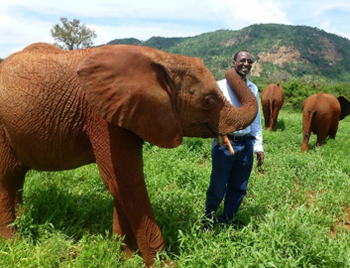
Dear Partners and Friends of ANAW; I am amazed at just how fast the year has gone by. It seems so recent when I was wishing us all a prosperous 2019! I am nonetheless grateful that we are marking the end of 2019 together having achieved much of what we set to do. In this year, together with Judiciary Training Institute and the lead agencies, Judiciary, Directorate of Public Prosecution, Kenya Wildlife Services, Kenya Forest Service and the office of the Attorney General Africa Network for Animal Welfare cohosted the law enforcement interagency forum on wildlife and environmental crimes. It is always encouraging to see the diverse stakeholders represented at forums discussing ways to enhance law enforcement on wildlife and environmental crimes. These forums known as The National Judicial Dialogues, are convened with the aim of encouraging agencies and the public to work in a collegiate manner, share information, exchange experiences and develop ways to overcome technical, bureaucratic and administrative bottlenecks hindering inter-agency cooperation in wildlife crimes management. Thanks to our partners UNODC, TRAFFIC and Wildlife Direct for their support in making it happen. Amongst key outcomes of the dialogues is that wildlife crimes has been elevated to an economic crime, the conviction rate has been reported to have significantly risen from 4% in 2013 to 90.5% in 2019 and the Wildlife Conservation and Management Act 2013 amended to improve it. We have remained true to our theme for the year, “Transforming Livelihoods through Responsible Care of Animals and Environment” in our thematic areas; Human-Animal Coexistence; Animal Care and Capacity Building and Education and Awareness. We can never forget to highlight this year’s Africa Animal Welfare Conference (AAWC2019) which for the first time went beyond the borders of Kenya to Ethiopia and attended by more than 200 participants from 37 countries; 23 from Africa and 14 from outside Africa and themed, “Animals, Environment and Sustainable Development in 21st Century Africa: An Interlinked Approach”. Noting the importance of engaging primary schools in animal welfare education, we have robustly sustained our Promoting Animal Welfare in Schools (PAWS)” Program with more than 40 schools from five counties (Nairobi, Kiambu, Kajiado, Machakos and Makueni) in Kenya. This engagement of the young school children is critical in ensuring that current and future generations embrace the need to prioritize animal welfare from their early years. We continue to acknowledge and deeply appreciate our long-time partners who have stood by us this far, as well as our newly found partners who have come on board to help us safeguard Africa’s animal welfare. We are therefore, in line with our drive this year, glad to highlight a few of our achievements during the last quarter of this year, in the following pages. Enjoy the read. Wishing you all the best this Christmas Season and a Happy and Prosperous New Year 2020!. Sincerely, Josphat Ngonyo, |
A Young Bull’s Life Cut Short by a Wire Snare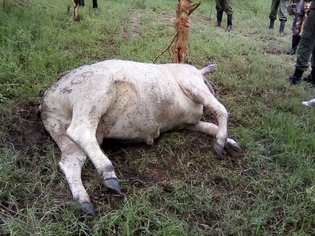
When a team of five ANAW staff left for a routine de-snaring exercise at the expansive Soysambu Conservancy, in Nakuru County, west of Nairobi Capital, on December 5, 2019, did not know that they would encounter one of their most disconcerting snare-removing experiences; it was a macabre scene, death, as usual in the bushes by a wire snare, had claimed an unusual life - young bull of a cow. The snare had tightly entangled the neck. That wire snare, trapping the unsuspecting cow is one of the many set up by poachers, who normally communities members bordering the conservancy, to trap wild animals mainly for commercial purposes. Not far from this scene a male zebra with a wire on its left hind-leg was found. Though alive, the zebra was writhing in pain and could not move. The wire was cutting in and immobilizing it, and it was only a matter of time before it could have been found by poachers for an easy kill. The Kenya Wildlife Service (KWS) Veterinary Officers in collaboration with ANAW’s Veterinary team managed to restrain and treat the zebra then releasing it back giving it a second chance to life. Since inception, ANAW has been able to remove 6,330 snares that would have killed animals, more than double that number of snares – 12,660, for wires can be re-used! Between 2009 and 2019, ANAW in collaboration with KWS has been able to rescue and give a second chance to life to more than 5,700 animals in both protected and unprotected areas of our operation counties – Nakuru, Kajiado, Machakos, Taita Taveta and Kwale. Further more, over 45,300 community members have been sensitized on the importance of habitat and wildlife conservation. In its mandate of envisioning a world where people show compassion, protection and care for all animals, ANAW’s de-snaring team keeps tracking wildlife, makes frequent trips to the wildlife areas both protected and non-protected areas to remove snares, educate communities and rescue trapped wildlife to give them another lease of life. |
Africa Conservation Education Fund Program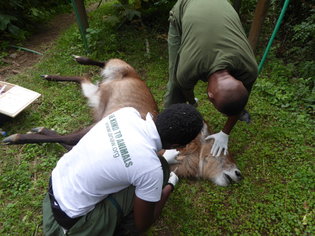
While wild animals are a treasure and pride of every nation, the glaring reality on the ground is that, most of these communities bordering wildlife areas, and who should typically be in the forefront protecting these wildlife species, are poor and their children have not had an opportunity to go to school to earn an alternative livelihood to bushmeat dependence. As expected, the cycle of poverty and killing of wildlife mainly for commercial purpose continues, often eliminating them in inhumane and painful manner. ANAW has come up with an initiative that seeks to provide a lasting solution; Africa Conservation Education Fund (ACEF) that will offer scholarships to 50 children annually from poor families living near wildlife areas in Kenya so that they are able to ultimately get employment and hence have alternative income. In addition, 50 unemployed youths will access vocational trainings to enable them to start enterprises for income generation as opposed to killing wild animals. 50% of those trained will be women. Please join us in protecting these animals by donating through the following link: click here. |
The 9th National Judicial Dialogue on Wildlife and Environmental Crimes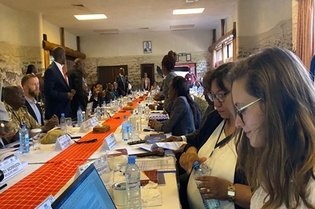
In collaboration with the Judiciary Training Institute (JTI), and the lead agencies; Judiciary, Directorate of Public Prosecution, Kenya Wildlife Services, Kenya Forest Service and the office of the Attorney General, ANAW cohosted the 9th National Judicial Dialogue on Wildlife and Environmental Crimes that was held on 8-12 December 2019 at Serena Amboseli Lodge within the Amboseli National Park. The forum, themed Wildlife Crime as a Transnational Economic and Organised Crime: Inter-Agency Cooperation in Managing Emerging Challenges and Frontiers, brought together 106 participants drawn from the Judiciary, Office of the Director of Public Prosecutions, Attorney General’s Office, the Assets Recovery Authority, Directorate of Criminal Investigations, National Police Service, Kenya Wildlife Service, Kenya Forest Service, Kenya Revenue Authority, Kenya Ports Authority, Kenya Airports Authority, Ethics and Anti-Corruption Commission, Conservation Organizations, Civil Society Representatives and Community Representatives. Also present were a Magistrate from Namibia, Ms. Alexis Diergaardt and senior Judge Hon. Antonio Namburete from Mozambique. Kenya Wildlife Service (KWS) Director General, Brig. (Rtd) John M. Waweru in his speech read by Joseph Sarara, the KWS Head of Investigations, pledged full support to the judiciary and prosecution in the fight against wildlife crimes. He consequently urged the law enforcement and all present to build upon existing commitments and new partnerships to curb criminal networks. In his opening remarks, ANAW’s Executive Director, Josphat Ngonyo noted the dialogues’ impact, “Since 2013 when these dialogues started, wildlife and environmental crimes have been elevated to economic crimes, the conviction rate has risen substantially and the wildlife conservation and management act 2013 was amended to strengthen it. All this championed by the 16 law enforcement agencies. ANAW’s appreciation goes to Trade Records Analysis of Flora and Fauna in Commerce (TRAFFIC) and the USAID-funded Wildlife Trafficking, Response, Assessment and Priority Setting (Wildlife TRAPS), World Wildlife Fund (WWF), the United Nations Office on Drugs and Crime (UNODC) and WildlifeDirect for providing funds to make this 9th Judicial Dialogue a reality. |
Under the Skin Update Launched in Abuja, Nigeria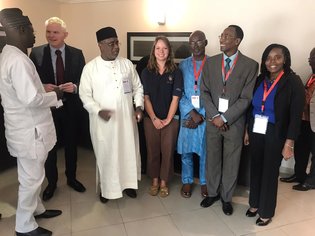
ANAW joined other the Donkey Sanctuary and other animal welfare stakeholders in Abuja, Nigeria during launch of ‘Under the Skin Update’ on November 21, 2019. The stark reality of the plight of donkeys was brought to bare giving credence to the fact that if donkey skin trade for Chinese ejiao is not halted in Africa, Donkeys population will drastically be decimated and in some countries such as Key be extinct by 2023. Other African countries were urged to borrow a leaf from Nigeria who have passed a law banning the trade and protects livelihoods of communities dependent on donkeys while safeguarding donkeys from theft and slaughter for their skins. |
Donkey Skin Trade Conference 2019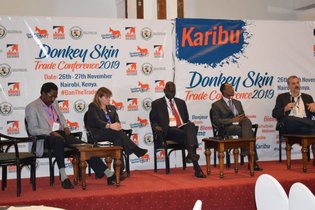
ANAW participated in Donkey Skin Trade Conference, themed, ‘Donkeys are Better Alive’ which happened in Nairobi’s Laico Regency Hotel between 26th – 27th November 2019 and organized by Brooke EA and Intergovernmental Authority on Development (IGAD). ANAW’s Executive Director, Josphat Ngonyo, joined Alexander Juras (UNEP), Petra Ingram (Brooke UK), Dr. Mwanda Mbaka Consultant World Animal Protection, among other leaders in a panel discussion on the Resolutions on Animal Welfare towards United Nations Environment Assembly Five (UNEA 5). Sebastian Mwanza, ANAW’s Senior Communications Officer and Livingstone Masija, Chief Executive Officer, Arusha Society for the Protection of Animals (ASPA) made a joint presentation on the Implications and Impacts of Cross Border Movement and Illegal Trade of Donkeys on Kenya/Tanzania Border. ANAW has been undertaking a project since July 2019, aimed at ascertaining the existence, nature, and frequency of illegal cross-border movement and trade of donkeys on Kenya Tanzania border, focusing on Narok and Kajiado Counties borderlines. |
Diani Sea Turtle MonitorsThe 12 ANAW supported volunteers from the local Diani community have continued to monitor security, safety and welfare of turtles in South Coast of Kenya. The monitoring includes recording of turtle sightings, finding and securing of turtles’ nests and compiling reports of live and dead turtles within the project area between Tiwi Beach and Funzi Island, a coastline of almost 52 kilometres. A total of 20 nests were recorded in different places between September and December 2019, as well as recording 11 nests that hatched during this period. The total number of hatchlings recorded for the past three months amounting to 1349 ANAW is committed to working with communities in our project areas to ensuring all animals are safeguarded and protected. African Ministerial Conference on the Environment (AMCEN)The 17th Ordinary Session of the African Ministerial Conference on the Environment (AMCEN) took place at the Olive Convention Centre in Durban, South Africa from November 11-15, 2019. The Consultative meeting brought together Civil Society Major Groups and Stakeholder (MGS) accredited to the United Nations Environment Programme (UNEP) member states, international organizations, UNEP and the private sector. ANAW, whose accreditation to the United Nations Environment Programme was extended for three more years in August this year, was represented at the Pre AMCEN-Civil Society meeting on 9-10 November by the Director of Programs, Josiah Ojwang. |
Denver University Study Conservation Solutions through a Social Work Perspective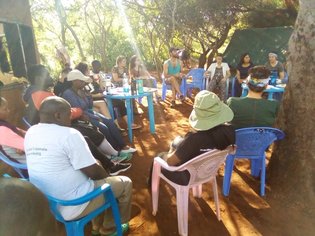
The University of Denver Graduate School of Social Work (GSSW) and Africa Network for Animal Welfare (ANAW) saw an eleventh successful trip take place from December 3rd to 17th, 2019 in Kenya. This year, the group explored the theme, Context, Conservation, Empowerment and Sustainability. The Conservation Social Work course is an annual trip sponsored by the Institute for Human-Animal Connection (IHAC) in conjunction with ANAW which trains social workers utilizing a bio-social and bio-centric framework to understand and intervene in critical conservation issues. Eleven students participated in the two-week intensive experiential service-learning course, which was delivered by the lead faculty Erica Elvove, and the Co-faculty Hope Wisneski, who is also the Chief of Staff/Associate Dean for Operations at the Graduate School of Social Work (GSSW). The course is designed to introduce students to the social, political, economic, and cultural and conservation issues of Kenya and East Africa. As a hands-on organization, ANAW assisted the team to visit organizations and social enterprises set up in Kenya to address environmental challenges by using entrepreneurship to achieve sustainability. The team visited communities and conservation areas in Naivasha, Kasigau, Voi, and Diani in Kwale. The course encourages students to gain skills to assess problems and gain hands-on professional experience with solutions designed to enhance the health of individuals, families, and communities through local sustainable economic empowerment, advocacy, humane education and environmental education. |
End of Year Best Wishes!!!And finally,... From the entire team at ANAW in Africa and in the USA: The love that our animals show us envisions a glimpse of God’s magnificent love for humankind. And as this festive season snuggles us in happy clouds of love, laughter, warmth and peace, WE wish you a very Merry Christmas and a Happy Prosperous New Year 2020. |
|
Support Our Work You can support our work by donating online through our secure online platform using a credit card. Please, click here to donate . Leave a Legacy in Your Will By putting a bequest to ANAW in your will or trust, you will help us to improve the lives of animals far beyond your lifetime. Contact Purity at This email address is being protected from spambots. You need JavaScript enabled to view it. if you need additional information about how to include us in your will.
|
